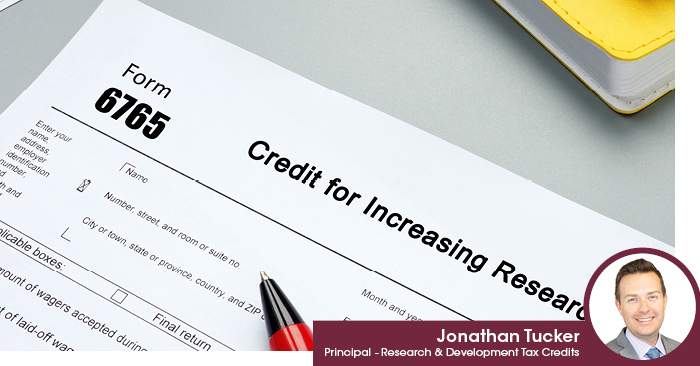Follow KBKG on Social Media
By Jonathan Tucker | Principal, Research & Development Tax Credits
As the dust settles following the passage of the One Big Beautiful Bill Act (OBBBA), many small businesses and their CPAs are navigating the mechanics of Section 174A, the newly enacted provision that restores the ability to expense R&D costs for all businesses starting in 2025. Businesses can also capture the remaining deductions for 2022 through 2024 in 2025, or via amended tax returns for certain eligible small business taxpayers. This retroactive election for certain eligible small businesses is only available for one year after OBBBA was enacted (i.e. through July 3, 2026).
While the intention of the legislation is clear, relief for small businesses from the burdensome amortization rules introduced by the Tax Cuts and Jobs Act (TCJA) of 2017, and the procedural guidance around elections and filing logistics remains murky, especially for those who haven’t yet filed their 2024 tax return. The big question is, if a small business wants to expense its 2024 R&D costs under Section 174A, does it need to first file with capitalization and then amend, or can it file now with the expenses fully deducted?
What Section 174A Allows
Section 174A provides a retroactive election for “certain small businesses,” which are those with average annual gross receipts of less than $31 million for the prior three-taxable-year period for the first taxable year beginning after December 31, 2024. If the taxpayer qualifies, they can:
- Expense all remaining domestic R&D costs incurred in 2022, 2023, and 2024 via election under 174A.
- Apply the election by amending 2022 through 2024 returns already filed, or, depending on future guidance, possibly incorporate it into original returns not yet filed.
Where the Confusion Lies
The language in the OBBBA has raised concerns due to its wording and timing, stating a taxpayer must file an amended return for any tax year “affected by the election.” It all comes down to what “affected” means in this context:
- The literal interpretation says if you want the election to apply, then you must file with capitalization and then amend to apply the election, even if you haven’t filed yet.
- The potential spirit-of-the-law interpretation says if your original return already treats R&D costs as deductible and you’re clearly eligible as a small business, then you’ve honored the intent of the election. In that case, there’s no need to amend, because the return already reflects the substance of what the law is trying to permit, providing immediate relief for small businesses without procedural burdens.
There also is confusion with the “gross receipts” test under §448(c) that allows for this election. Under §448(c), the gross receipts test looks at the three-year average of gross receipts ending with the tax year that precedes the tax year in question.
§174A states if the test is applied for the first taxable year beginning after December 31, 2024, you look at 2022–2024 to determine eligibility, but if you haven’t filed 2024 yet, how can you prove eligibility? This is an apparent Catch-22 in the current law, as you can’t apply the election until you’re eligible, but you also can’t confirm eligibility until you’ve filed the very return you want to apply it to.
One critical point often overlooked in the current discussion around Section 174A and expensing on the 2024 tax return is the importance of properly addressing prior-year capitalized R&D costs before filing the 2024 return with immediate expensing. While many advisors might focus on the ability to deduct 2024 R&D costs under the small business election (under the “spirit-of-the-law” interpretation), filing 2024 correctly may also require amending the 2022 and 2023 returns first. Otherwise, you risk erasing previously capitalized Section 174 assets and their related amortization deductions reported on Form 4562 in 2024 without making a formal change in accounting method.
This could raise compliance flags, as you’re effectively removing two prior-year capital line items from the books without clear documentation or adjustment. This could be seen as a retroactive accounting method change done outside the proper procedures. Practitioners should consider the impact of 2022 and 2023 when deciding whether to capitalize or deduct on the 2024 return.
As of now, no definitive guidance has been issued to resolve this tension. Taxpayers should continue to capitalize and amortize on their 2024 tax returns.
Takeaways for CPAs and Clients
Until clearer IRS guidance is issued, taxpayers should read the literal words of the law and should continue to capitalize and amortize on their 2024 tax returns. However, here’s what the spirit-of-the-law may suggest for taxpayers who haven’t filed their 2024 returns yet:
- If you’re an eligible small business and plan to expense your 2024 R&D costs, consider the following:
- Make the §174A election as directed by the current language (likely as a statement attached to the return)
- File your original 2024 return with R&D costs deducted, assuming your facts clearly qualify you under the small business criteria and you believe you have the authority to do so
- Retain documentation supporting your election and eligibility
- Be prepared to amend if the IRS later requires it
- If you’re an eligible small business and read the literal text, the 2024 return should be filed with R&D costs capitalized and later amended to make the election and recover the remaining deductions.
There is a risk if there is no guidance issued before the tax filing deadlines, or the IRS determines amendments are required. Beginning in 2025, all taxpayers will be able to expense R&D expenses and catch-up all missed R&D expenses from 2022-2024. It might be best to wait and see before anyone does anything.
Conclusion
This ambiguity highlights the broader challenge with post-enactment procedural gaps. Congress passed Section 174A to provide relief, but the IRS now needs to clarify the administrative path forward, particularly for unfiled 2024 returns.
The impact of the Section 280C election should also be considered when amending tax returns. The OBBBA allows the retroactive election of Section 280C, reducing the credit and allowing the taxpayer to forego an addback to income, which could otherwise trigger additional amended returns at the state level.
In the meantime, tax advisors should proceed with caution and proper risk tolerance and monitor for additional guidance. To learn more about the impacts of Section 174A, tax preparers and business owners are encouraged to contact a KBKG expert today.
About the Author
Jonathan Tucker | Principal – Research & Development Tax Credits
Jonathan Tucker is based in Atlanta, GA, and has over 20 years of experience providing federal business tax advisory services, primarily in R&D tax credits, to clients in various industries including technology, manufacturing, transportation, healthcare, retail and consumer products, hospitality, media and entertainment, financial, and other professional services industries. Read More



